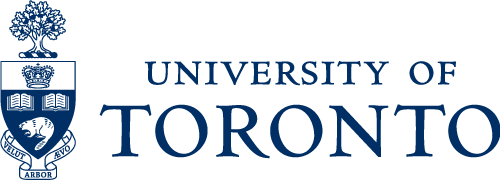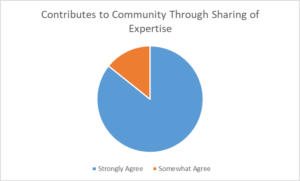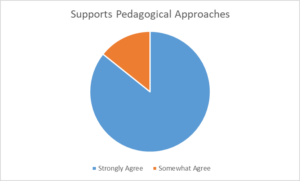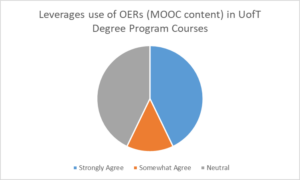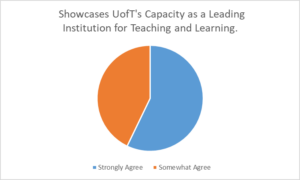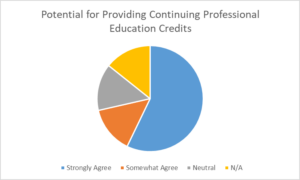The University of Toronto has been a pioneer in the Massive Open Online Course (MOOC) space, partnering with two platform providers, Coursera and edX since 2012.
MOOC proposals are administered and funded through the Open Course Initiative Fund (OCIF), and successful applicants are supported by the Digital Learning Innovation (DLI) portfolio. Over the years we have produced and offered a total of 54 unique MOOCs across the following domains:
- Computer Science
- Business
- Health
- Physical Science and Engineering
- Social Sciences
- Personal Development
- Data Science
This 2023 MOOC report showcases the impact our MOOCs have had, measured against the foundational goals identified for our MOOC activity and OCIF program, to:
- Contribute to the education community and the broader public through sharing of institutional expertise and open curriculum content
- Explore and evaluate a range of pedagogical approaches and open course platforms
- Leverage use of open educational resources through integration into University of Toronto degree program courses
- Showcase the University of Toronto’s capacity as a leading institution for teaching, learning and research
In response to a new opportunity, we also reflect upon the interest in, and ability to, provide on-demand continuing professional education (CPE) credits for professionals in our MOOC courses.
MOOC Reach
As of the publication of this report, over 4,200,000 learners from 182 countries have enrolled in our courses offered through Coursera and edX. These learners have earned over 300,000 course certificates. On any given day there are over 1,000 learners active across our MOOC portfolio. The reach our courses have on so many learners from around the world serves to showcase the University of Toronto as a leading institution for teaching, learning and research. Participant feedback shows that students have applied to, and attended, the University of Toronto because of their introduction to the institution via our MOOC offerings.
Alumni Relations
Since 2014, U of T Alumni Relations have partnered annually with us to provide a unique, instructor-guided MOOC curated for the alumni community. These courses are designed specifically with the alumni experience in mind, with the following benefits:
- A private learning space, created just for the alumni who register for the course.
- Access to the course instructor through virtual office hours.
- Extra content items to engage alumni participants.
- Special live events for alumni.
Since its inception over 12,000 alumni have participated in the alumni MOOC program. Alumni relations continues to partner with us on this initiative. This partnership has extended MOOC reach to the education community and the broader public through sharing of institutional expertise and open content.
Coursera for Campus
The University of Toronto is a member of the Coursera Partner Consortium, a content-sharing initiative that makes it possible for universities to share MOOC content with other participating Coursera partners. First introduced in support of partner institutions impacted by COVID-19, the program provides U of T students and staff with access to self-directed learning and certification of completion of Coursera offerings at no cost. To date we have nearly 50,000 enrolments, and over 155,000 lessons (a unit of content within a course including several items) have been taken through this unique initiative. While the partner consortium does not explicitly integrate content into degree programs, this initiative does leverage our sting open educational resources to support students enrolled in our degree programs.
MOOC Impact: Instructor Perspectives
To understand how courses have impacted the work of the instructors and their departments, we extended a survey to every instructor who had at least one live course or had a course completed within the previous 3 months of the survey date of June 2023.
Of the fourteen instructors we sent the survey to, seven completed it in full. Of note, four of the seven responders have specializations (a series of MOOC courses that provide a path of learning) and thus currently provide 17 distinct courses on our MOOC platforms.
Survey Results
The survey questions were focused on our institutional goals noted above with results as follows:
Instructor Reflections
Instructors were also asked to reflect upon how their MOOC activity has supported the goals identified. We provide a selection of their comments in relation to the MOOC goals identified below.
Exploring and Evaluating a Range of Pedagogical Approaches
One participant reflected on how the MOOC offers them the opportunity to support their research and helped build their pedagogical approach for other teaching.
Contributing to the Education Community and Showcasing U of T as a Leading Institution
All participants noted ways in which MOOC content is contributing to the broader education community and agreed that their MOOCs serve to showcase the University of Toronto as a leading institution for teaching, learning and research:
- The University of Toronto is now widely recognized as the leading centre for research and teaching in Behavioural Economics.
- The large enrollment numbers in our courses build knowledge globally of our content and build our brand.
- The MOOC has helped build awareness of my department on an international stage.
- Having a specialized version of the MOOC (i.e. Alumni) reinvigorated the course
Leveraging MOOC Content for Degree Program Courses
Instructors noted various ways they are leveraging their MOOC content to enhance their University of Toronto degree program courses, including:
- Pioneering the adoption of a flipped classroom
- Clarifying and providing resources for some on-campus, traditional teaching efforts
- Using the material for both undergrad and grad classes (with additional exercises)
Instructors had varied experiences in relation to the goal of leveraging the use of open educational resources through integration into University of Toronto degree program courses. Several instructors have made very purposeful decisions to integrate their MOOC content into their U of T courses and noted their use and successful integration (see above). There may be potential to extend the impact through further design planning to support the integration of MOOC content for degree program offerings.
Provision of CPE credits
The ability to provide on-demand continuing professional education (CPE) credits for professionals is a new area of exploration and innovation for some of our project leads. Three professional MOOCs are offering CPE credits as of this report with another in development. Having experienced the workflow and administration of providing CPE credits in three courses we are now well positioned to advise future MOOCs on how they might plan for CPE credit recognition in their design.
Summary
This summary report highlights the ongoing impact of University of Toronto initiatives within the MOOC space. Data and instructor commentary signals that their MOOCs have successfully contributed to the education community, showcased innovative pedagogical approaches, and reached a global audience. It also suggests the potential for MOOCs to become an important element of the lifelong learning ecosystem at the university through exploration of on-demand professional education credits and other forms of micro-credentials that can expand opportunities for continuous learning.
